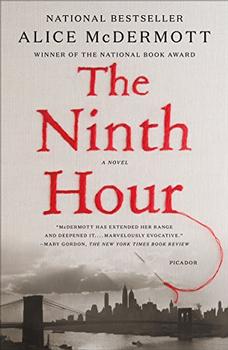Summary | Excerpt | Reading Guide | Reviews | Beyond the book | Read-Alikes | Genres & Themes | Author Bio

A multi-faceted, multi-voiced debut novel that is a personal and heartfelt-chronicling of a family in flux, trying to find their individual and collective way-and also tells a larger, cultural story.
The crowds keep coming. More and more every day it seems ... drawn by rumor and whisper and desperate wish. Somehow they heard about the little girl on Shaker Street." They come to see eight-year-old Anabelle Vincent, who lies in a comalike state - unable to move or speak. They come because a visitor experienced what seemed like a miracle and believed it was because of Anabelle. Word spread. There were more visitors. More miracles. But is there a connection? And does it matter?
Set against the backdrop of the approaching millennium - with all its buzz about reckoning and doom--this impressive debut novel is narrated by Anabelle herself; by her devoted mother, who cares for her child while struggling to make sense of the media frenzy surrounding her; by Anabelle's estranged father, who is dealing with the guilt of his actions; and by the people who come seeking the child's help, her guidance, and her healing. Yet it tells a larger cultural story about the human yearning for the miraculous to be true, about how becoming a believer - in something, anything, even if you don't understand it - can sustain you.
The style Roe employs in here is delicately balanced. His language is plain without being pretentiously derisive. The balance of perspectives, from daughter to mother to father to visitor, is consistent. The narrative is confidently told, and it glides along smoothly, free of bumps or bruises. Moving from chapter-to-chapter, I felt like I was in good hands...continued
Full Review
 (625 words)
(625 words)
(Reviewed by Bradley Sides).
Andrew Roe's The Miracle Girl follows the life of Anabelle Vincent, a comatose girl who many believe grants miracles. Of course, there are skeptics who surround the young Anabelle, too, and so the novel asks readers to question whether they are believers or skeptics.
 The occurrence of alleged miracles is, of course, not a new topic. It's one that has garnered interest for many years, even centuries. But if we examine the cited miracles that have occurred in the modern day compared to centuries before, the decrease is large. Why is this? It is not, necessarily, because people don't believe. According to Craig Keener (Professor at Asbury Theological Seminary), in a 2011 Huffington Post article: "Various polls peg U.S. belief in ...
The occurrence of alleged miracles is, of course, not a new topic. It's one that has garnered interest for many years, even centuries. But if we examine the cited miracles that have occurred in the modern day compared to centuries before, the decrease is large. Why is this? It is not, necessarily, because people don't believe. According to Craig Keener (Professor at Asbury Theological Seminary), in a 2011 Huffington Post article: "Various polls peg U.S. belief in ...

If you liked The Miracle Girl, try these:

by Alice McDermott
Published 2018
Rendered with remarkable lucidity and intelligence, Alice McDermott's The Ninth Hour is a crowning achievement of one of the finest American writers at work today

by Emma Donoghue
Published 2017
In Emma Donoghue's latest masterpiece, an English nurse brought to a small Irish village to observe what appears to be a miracle - a girl said to have survived without food for months - soon finds herself fighting to save the child's life.